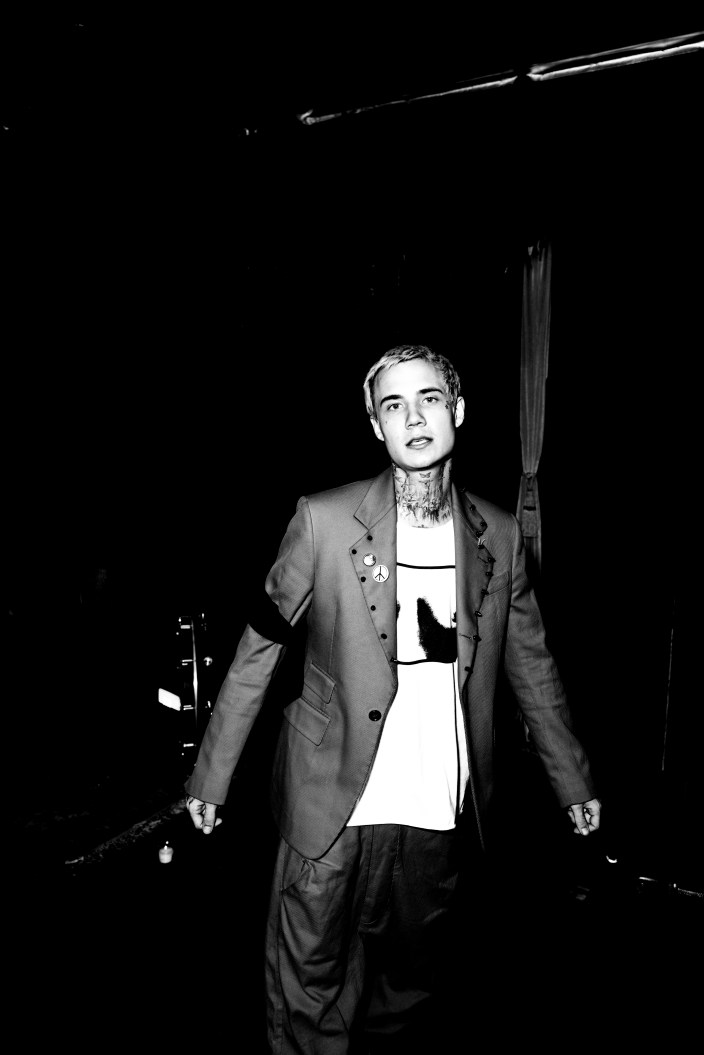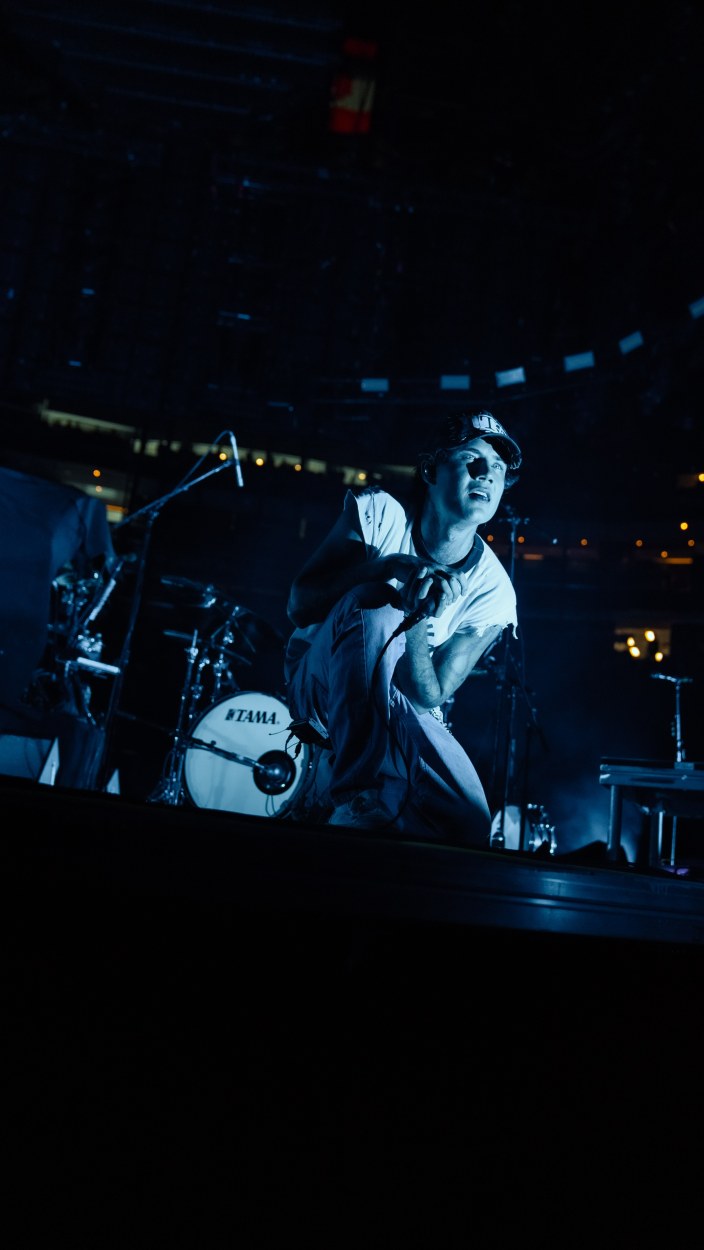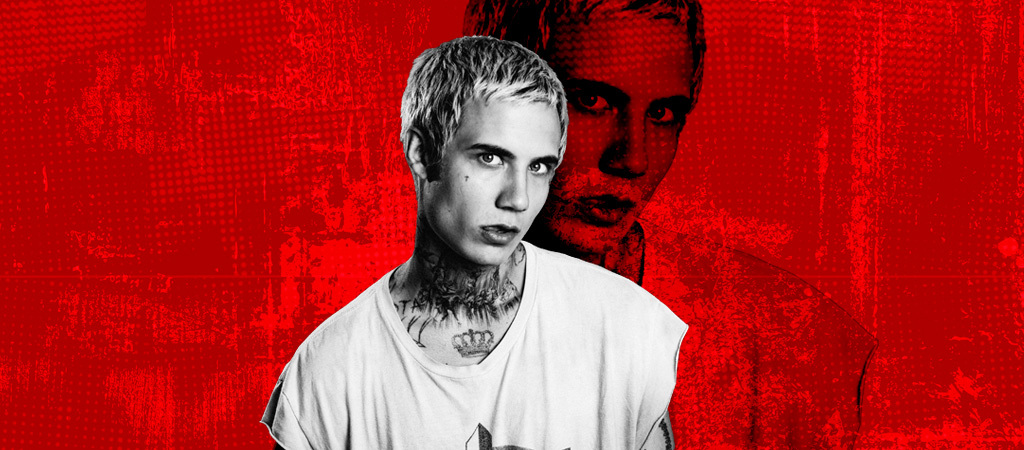Jxdn flashes a warm smile when he greets me at his front door. He’s standing on a multi-colored “JXDN” entryway rug, which matters because he once abandoned his identity. But on this blue-skied, sunny May afternoon, Jxdn is proud. We had met the evening prior at Warner Music’s headquarters in downtown Los Angeles, and he had been dangerously dehydrated with a fever, which scared him because it presented an excuse to revert to self-destructive patterns. He’d anxiously paced, his head spinning with manic impulses, and wished he were in his bathtub. But he’d shown up to perform acoustic versions of “Sad October,” “You Needed Someone I Just Happened To Be There,” and “Just Let Go” from When The Music Stops, his sophomore album out now via DTA Records, because he cares more about music than comfort.
“It was so important that I went yesterday,” the 23-year-old artist born Jaden Hossler says. “I can’t just say sh*t anymore. I have to do it.”
Jxdn has worked hard to reconfigure his comfort zone. Two Junes ago, his foundation was shattered when Cooper Noriega, his best friend and biggest fan, died from an accidental overdose. Jxdn hid — what good was anything if he couldn’t have Coop? — and stopped listening to music. It was an inconceivably dark comedown from the euphoric highs he’d experienced after being hand-picked by Travis Barker as his first DTA Records signee, releasing his July 2021 debut Tell Me About Tomorrow (spawning pop-punk/rock hits “Angels & Demons” and “Better Off Dead”), opening on Machine Gun Kelly’s Tickets To My Downfall Tour, and headlining his first tour.
“I don’t want to be famous anymore,” Jxdn says. “I don’t want the extremes. I want the grey because that’s where the gold is. Nobody sits in the grey.”
On this afternoon, we’re sitting in the grey. His friends, including longtime manager Shannon Bayersdorfer and roommates Onyx Mayor and Quinton Griggs, huddle in the movie room. Jxdn’s brand-new Maltipoo puppy, Kurt — named after Kurt Cobain — darts around for scratches. Jxdn moved in two months ago after ending his high-profile relationship with Stassie Karanikalaou. In the past, he would have isolated and self-sabotaged, but it dawned on him he’s happiest when his home is full of people — people dedicated to changing the world through music, to be specific.
“Every breakup I’ve gone through has destroyed me,” he admits. “I really loved this girl. That was the hardest thing I’ve ever had to do. I hadn’t been spending time with people of my nature. At heart, I’m kind of a little rat. I felt a lot of inferiority with my girlfriend and her friends because they are the biggest celebrities in the world. It’s nobody’s fault but mine, but I just had to change my environment. I would’ve been very happy with her, but I wouldn’t have been very happy with myself. I needed to marry music again.”
In the kitchen, Chef TJ unintentionally affirms Jxdn’s decision. “I was on FaceTime with one of my best friends in France last week,” TJ says while preparing a Southern feast that Jxdn and his friends will devour in two hours. “He has a daughter, and she was like, ‘I’m going to see that guy from California. His name is Jxdn.’ She showed me her ticket, and it was you.”
Jxdn is cautiously excited about his upcoming European promo trip for When The Music Stops: “I don’t like leaving my house, but I need to go talk to my fans. I’m an in-person person. I think that’s the best way people can at least try to understand what I’m trying to do.”
As such, Jxdn asks if he can play me a few in-progress songs. To watch him sing along and play air guitar with his eyes closed, as if nobody is in the room, is to instantly understand him. His all-consuming passion and aching transparency covers every square inch of When The Music Stops, a 17-track album encapsulating two years, nine genres, and infinite emotions.
“Coming out of the hardest time of my life, I was ready to give up completely,” Jxdn says. “I’ve been fighting to feel the way I feel for as long as I can remember, to the point where it broke me. I am willing to lose everything to do what I’m doing, but that is not the only option. I think that’s what people forget: We don’t have to lose everything to make things better.”
Jxdn only knows that because he lost everything.

Growing up, Jxdn moved 15 times. His adolescence was split between Texas and Chattanooga, Tennessee, with his two sisters. His parents were pastors. He was constantly exposed to new cities and peers, but he remained sheltered and severely depressed, surviving suicide attempts. “I was never opened up to the world,” he says. “I didn’t know you could have posters, didn’t know you could go to concerts. I would make friends, lose friends, and I was always trying to fit in.”
Jxdn’s chronic desire to fit in led him to TikTok in 2019 — earning money and millions of followers. He toured the United States, relocated to LA, and attended his first concert. At 18, he witnessed the late Juice WRLD perform “Empty” and knew music was where he belonged. He made up for lost time, squeezing the world for all it’s worth, with Noriega by his side. “I don’t want to discredit the other people in my life, but everybody knows that Cooper was my first genuine best friend,” he says.
After Noriega’s death, Jxdn crashed for eight weeks with Bayersdorfer, his manager since March 2020 whom he says “knows me better than anyone” and grieved Noriega.
“We always talked about dying, but it didn’t seem like it would actually happen,” Jxdn says. “I died when he died. I started taking a lot of drugs, and my goal was not to kill myself, but also not to keep myself alive.”
On May 26, 2023, he performed at The Cumberland Hotel in London but was “spiraling, feeling incredibly manic and dissociated,” so he flew home early and checked into a 21-day treatment program in San Diego.
“I’m not an addict; I just suffer,” he says. “I was more interested in the escape of it all, but it turned into this weird obsession.”
Jxdn left San Diego sober but convinced he needed to get clean from himself. Soon thereafter, Jxdn called a meeting to sell his label on why he should rebrand as Jaden Hossler, the pop star, which he briefly did with the October 2023 single “Chrome Hearted.” Jxdn and Bayersdorfer hadn’t spoken in months. Barker had unfollowed Jxdn. Those who had been there through Noriega’s death feared they’d lost Jxdn. “After [the meeting], I got in the car, called his mom, and sobbed because I was looking at somebody I did not know and could tell he was running from the truth,” Bayersdorfer says.
The truth confronted Jxdn at When We Were Young Festival last October. Seeing “Jaden Hossler” on the screen behind him sprung loose what he’d been avoiding.
“All my numbers had fallen [online], and as much as I don’t care now, it affected me to go from getting a million likes on anything I posted — I would chop off my left hand to get rid of those videos — to no one congratulating you anymore,” Jxdn says. “I don’t know if I would be here if I hadn’t been embarrassed to look at myself. You can’t carry that sh*t with you when you’re trying to create beautiful things. You already have enough weight inside your head as an artist.”
A few weeks later, he traveled to Brazil and was met by fans who had gotten “JXDN” tattooed where he’d autographed their bodies during his trip to Brazil for Lollapalooza 2022, and it hit him. He’d ruined the most beautiful thing he’d ever created.
“[At Lollapalooza], we were with Taylor Hawkins the night before he died,” he continues. “That night, Dave Grohl looked at everyone, pointed at me, and said, ‘Yo, take care of that kid.’ That doesn’t just happen to people. Going back to Brazil, I already knew it was going to be special, but [it showed me] Jxdn isn’t me; it’s us.”
Upon returning home, Jxdn asked Barker to meet in person. He looked his mentor in the eye and said, “I f*cked up. I need you.” Barker, Blink-182’s iconic drummer, is keenly familiar with the confusion of young stardom and trauma of losing a best friend to overdose. Barker knew Jxdn’s epiphany was a matter of when, not if. Two years ago, they made “Sad October,” a melodic, raw confessional, and Barker told Jxdn, “This is you.” Like Noriega, Barker saw Jxdn before Jxdn saw himself.
After their reconciliation, Barker, Jxdn, and producer Andrew Goldstein hit the studio and rapidly crafted When The Music Stops. Barker executive produced and played drums. Jxdn missed his emo, punk, and rock roots, discovering bands like Deftones, Nirvana, The 1975, or The Strokes, and craved music intended to be enjoyed purely at shows. “I didn’t want to [chase] hits,” he says. Jxdn’s authenticity inspired Goldstein, who says, “He knows what he wants to say. It was a good reminder for me, like, ‘Oh, just being yourself is good enough.'”
Jxdn and Hunter Moreno, his close friend and photographer/videographer since 2021, shot 15 When The Music Stops visuals, and Moreno watched Jxdn slowly open up again in the process. Filming the video for “Drugs,” a gut-punch of an acoustic ballad, signaled to Jxdn, Moreno, and Bayersdorfer that “Cooper is everything, everywhere,” as Jxdn says. While organizing candles on set, they landed on exactly 28 candles without counting. Noriega’s birthday was June 28 — not coincidentally, When The Music Stops‘ release date — and 28 was his favorite number.
“Years prior, I did this photoshoot with Cooper where I sat him in the middle of heart-shaped candles,” Moreno says. “It was this really beautiful photo that ended up being Jxdn’s cover art for [28 (Songs For Cooper)]. I put Jxdn in the middle of a heart surrounded by candles and let him sing this beautiful ballad. It was one take. The camera didn’t move. I cried like a little baby.”
Moreno adds, “I don’t think any of us will ever be the same, but he’s getting up every morning. I’m proud seeing the light turn back on in him. All he wants is for his music to be heard and to be felt, and he doesn’t care how many people it’s being felt by.”
Even if it’s an audience of one. Jxdn sings to Noriega on several songs, like “Drugs” (“I guess you’ll never know if I ever got help / Oh, the drugs don’t work anymore / Yeah, I’ve tried them all before”) and “When The Music Stops” (“Are you letting me know / That I should be letting you go?”)
Jxdn accepted that nobody could ever replace Noriega. With that, he realized that the best way to honor Noriega is to love others as much as Noriega loved him.

Three days before the album drops, Jxdn calls me from his backyard. He’s so overwhelmed by what he’s experienced since we sat together in his backyard that he doesn’t know where to start. Most recently, he opened for Blink-182 in Orlando and Miami.
“I came off stage and felt the history of it all,” he says. “I’ve never been ready to reach my full potential. My entire career so far was just the prequel. My actual career, who I am, starts now. I blocked Travis out after I got on that pop kick. I knew that he knew that that wasn’t me, and I knew he would tell me that. He saw the vision before everybody. What I’m doing right now is why he signed me four years ago.”
As full-circle as those Blink shows were, Jxdn was viscerally moved by his intimate When The Music Stops fan sessions at the end of May. In Paris, When The Music Stops rang through the corridors of The Louvre. In London, he met fans at a skatepark and beer garden. In Chicago, LA, Miami, and New York, he rented out theatres — no phones, masks on, just music. It felt like an extension of welcoming his friends into his home.
“We will have met somebody one time, and Jxdn will see them again and be like, ‘Hey, so good to see you again,’ and he genuinely means it,” Bayersdorfer says. “He remembers them because, with every interaction, he takes it to heart. Whether it’s for this album, the next one, or whenever that time comes, Jxdn is going to get his flowers because I know where his heart lies.”

If you ask Jxdn, he’s already getting his flowers because he’s learned what kind of flowers he values. “I need to feel the sun, listen to a new song, and see people and have that connection with people,” he says. “If I can have music, the sun, and people all together? Oh, man, nothing can beat that.”
He got all three in London. Jxdn sat criss-cross applesauce with 30 fans and noticed a few familiar faces from his mental break in London. Last May, he had walked to a nearby park to sit and smoke cigarettes. A group of fans recognized him and timidly approached.
“This kid taps me, and he’s like, ‘Hey, I don’t want a picture or anything, but is it cool if I just sit with you?'” Jxdn says. “He just wanted to sit with me, and so, we had a real human moment talking about our struggles. At this listening event, a year later, I saw the kid that came up and sat down with me, and I went up and gave him a hug. It was such an in-the-grey, mundane moment that I could never forget.”
Jxdn credits When The Music Stops with saving his life, and he refuses to waste it. In July, he’ll be happy to leave the house for his When The Music Stops Tour.
“One percent of me makes music; the other ninety-nine percent lives it,” Jxdn says. “Humans deserve to feel life again. I genuinely feel it’s a human right. It’s been taken out of our control by things in our pockets, TVs, computers, or social media. I talk about taking off the goggles of habit, and music allows me to do that. When the music stops, God — the world — keeps singing. We are music.”







